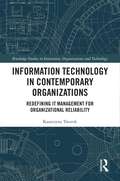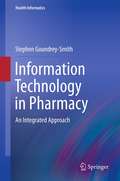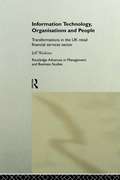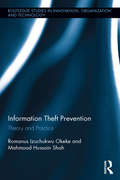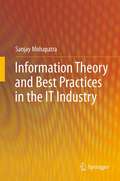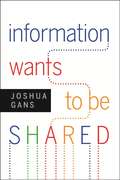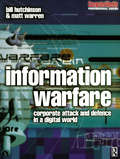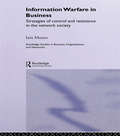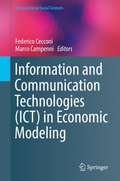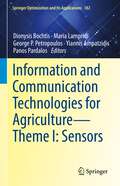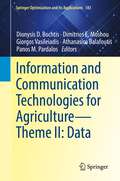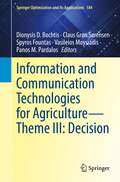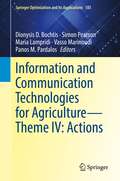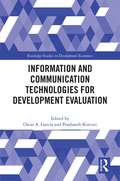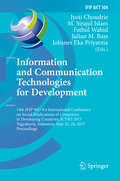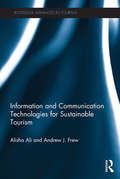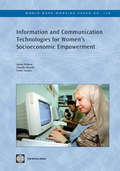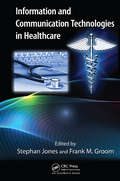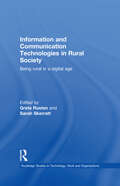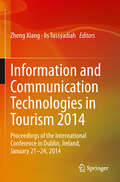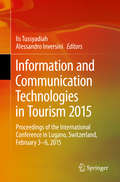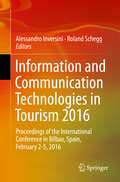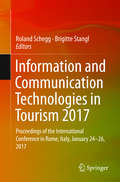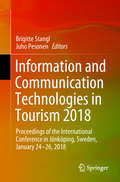- Table View
- List View
Information Technology in Contemporary Organizations: Redefining IT Management for Organizational Reliability (Routledge Studies in Innovation, Organizations and Technology)
by Katarzyna TworekDue to tremendous shifts in the business environment of contemporary organizations following the COVID-19 pandemic, there is a need to redefine the role and importance of information technology (IT) support, which is essential for ensuring an organization’s survival. Current models are no longer valid, as in the new turbulent and digitalized environment, the need for IT support is more crucial and indispensable than ever. This book proposes a new model explaining the factors inf luencing the efficiency of adaptable IT support in contemporary organizations, including those operating normally and during crises. The author demonstrates how organizations benefit from IT support, not only by enabling higher performance but also by facilitating organizational continuity, reliability, and even survival during various stages of crisis. The proposed model provides a basis for theory development in the field of organizational continuity and reliability, offering a new body of knowledge related to the factors boosting organizational performance gained from IT support and enabling organizational survival. This book will provide valuable findings for scholars performing research in the field of IT use in organizations, IT management, crisis management, and organizational reliability.
Information Technology in Pharmacy
by Stephen Goundrey-SmithIT in Pharmacy: An Integrated Approach aims to describe and discuss the major areas of pharmacy IT innovation (e-prescribing, drug databases, electronic patient records, clinical decision support, pharmacy management systems, robots and automation etc) from a systems and a professional perspective. It will also consider how the areas of pharmacy IT link together and can be used to enable and develop pharmacy professional practice. The book will examine pharmacy IT from an international perspective, taking into account all parts of the world where IT systems are used in pharmacy practice - namely - North America, the UK, Western Europe and Australia - and will compare pharmacy IT in the different regions. This book is from the author of Principles of Electronic Prescribing (Springer, 2008)
Information Technology's Support for Data and Information
by Thomas C. RedmanThe IT department's most important role is to provide applications that ensure that people can access the data they need and understand them, and help those who use them create quality data that will be useful down the road. These applications must be tightly aligned with well-defined business processes - a standard that most organizations fail to meet. There are other roles that IT should perform as well, including being responsible for the technical infrastructure and implementing data cleanups.
Information Technology, Organizations and People: Transformations in the UK Retail Financial Services (Routledge Advances in Management and Business Studies #Vol. 6)
by Jeff WatkinsThis wide-ranging volume presents in-depth research into the effect of new information technologies on organizational structure, assesses their progress towards transformation and describes the changes they are making to long-established business process roles, cultures and working practices. The book is based upon a series of rolling surveys carried out between 1989 and the present day, and funded by leading organizations such as IBM and KPMG. It provides a detailed picture of a sector in transition during a period of anxiety and doubt dominated by restructuring, downsizing and experimentation with re-engineering. As the 'lean and mean' emerge, they must now ask themselves if their competencies will enable them to survive into the next decade as competitors, such as Sainsburys, Virgin, Microsoft and Ford position themselves to become major players in the sector. This book is a major contribution to the debate on the growth of knowledge work, the need for core organizational competencies in the information age and the need for evolutionary, or radical, change.
Information Theft Prevention: Theory and Practice (Routledge Studies in Innovation, Organizations and Technology)
by Mahmood Shah Romanus OkekeAs retail businesses migrate to the digital realm, internal information theft incidents continue to threaten on-line and off-line retail operations. The evolving propagation of internal information theft has surpassed the traditional techniques of crime prevention practices. Many business organizations search for internal information theft prevention guides that fit into their retail business operation, only to be inundated with generic and theoretical models. This book examines applicable methods for retail businesses to effectively prevent internal information theft. Information Theft Prevention offers readers a comprehensive understanding of the current status of the retail sector information theft prevention models in relation to the internationally recognized benchmark of information security. It presents simple and effective management processes for ensuring better information system security, fostering a proactive approach to internal information theft prevention. Furthermore, it builds on well-defined retail business cases to identify applicable solutions for businesses today. Integrating the retail business operations and information system security practices, the book identifies ways to coordinate efforts across a business in order to achieve the best results. IT security managers and professionals, financial frauds consultants, cyber security professionals and crime prevention professionals will find this book a valuable resource for identifying and creating tools to prevent internal information theft.
Information Theory and Best Practices in the IT Industry
by Sanjay MohapatraThe importance of benchmarking in the service sector is well recognized as it helps in continuous improvement in products and work processes. Through benchmarking, companies have strived to implement best practices in order to remain competitive in the product- market in which they operate. However studies on benchmarking, particularly in the software development sector, have neglected using multiple variables and therefore have not been as comprehensive. Information Theory and Best Practices in the IT Industry fills this void by examining benchmarking in the business of software development and studying how it is affected by development process, application type, hardware platforms used, and many other variables. Information Theory and Best Practices in the IT Industry begins by examining practices of benchmarking productivity and critically appraises them. Next the book identifies different variables which affect productivity and variables that affect quality, developing useful equations that explaining their relationships. Finally these equations and findings are applied to case studies. Utilizing this book, practitioners can decide about what emphasis they should attach to different variables in their own companies, while seeking to optimize productivity and defect density.
Information Wants to Be Shared
by Joshua GansStewart Brand famously declared, "Information wants to be free." Except he didn't (not really). And it doesn't.Information is much more complicated than that. What information really wants-what makes it more valuable, useful, and immediate, Joshua Gans argues-is to be shared.Using the tools and logic of information economics, Gans shows how sharing enhances most information's value. He also shows how the business models of traditional media companies, gatekeepers who have relied on scarcity and control, have collapsed in the face of new technologies. Equally important, he argues that sharing can revive moribund, threatened industries even as he examines platforms that have, almost accidentally, thrived in this new environment.Provocative, intriguing, and useful, Information Wants to Be Shared will change the way you think about your ideas and the media you use to consume and produce them.HBR Singles provide brief yet potent business ideas, in digital form, for today's thinking professional.
Information Warfare
by Matthew Warren William HutchinsonThis text introduces the concepts of information warfare from a non-military, organizational perspective. It is designed to stimulate managers to develop policies, strategies, and tactics for the aggressive use and defence of their data and knowledge base. The book covers the full gambit of information warfare subjects from the direct attack on computer systems to the more subtle psychological technique of perception management. It provides the framework needed to build management strategies in this area. The topics covered include the basics of information warfare, corporate intelligence systems, the use of deception, security of systems, modes of attack, a methodology to develop defensive measures, plus specific issues associated with information warfare. This book will be of interest to executives and managers in any public or private organization. Specifically, managers or staff in the areas of information technology, security, knowledge management, public relations, or marketing should find it directly useful.Its main purpose is to make readers aware of the new world of information saturation; thus decreasing the chance that they will become victims of those abusing the information age, whilst at the same time increasing their chances of benefiting from the new opportunities produced.
Information Warfare in Business: Strategies of Control and Resistance in the Network Society (Routledge Studies in Business Organizations and Networks)
by Iain MunroInformation Warfare in Business provides a significant and interesting perspective on the concept of the network organization. It illustrates the relations between information technology and organization, and in particular, between business organizations and the recent revolution in military affairs that has been called 'information warfare'. The main themes discussed include the network society, knowledge management, nomadic strategy, information warfare, power and identity.
Information and Communication Technologies (Computational Social Sciences)
by Federico Cecconi Marco CampennìThis book presents the effects of integrating information and communication technologies (ICT) and economic processes in macroeconomic dynamics, finance, marketing, industrial policies, and in government economic strategy. The text explores modeling and applications in these fields and also describes, in a clear and accessible manner, the theories that guide the integration among information technology (IT), telecommunications, and the economy, while presenting examples of their applications. Current trends such as artificial intelligence, machine learning, and big data technologies used in economics are also included. This volume is suitable for researchers, practitioners, and students working in economic theory and the computational social sciences.
Information and Communication Technologies for Agriculture—Theme I: Sensors (Springer Optimization and Its Applications #182)
by Panos Pardalos Dionysis D. Bochtis George P. Petropoulos Yiannis Ampatzidis Maria LampridiThis volume is the first (I) of four under the main themes of Digitizing Agriculture and Information and Communication Technologies (ICT). The four volumes cover rapidly developing processes including Sensors (I), Data (II), Decision (III), and Actions (IV). Volumes are related to ‘digital transformation” within agricultural production and provision systems, and in the context of Smart Farming Technology and Knowledge-based Agriculture. Content spans broadly from data mining and visualization to big data analytics and decision making, alongside with the sustainability aspects stemming from the digital transformation of farming. The four volumes comprise the outcome of the 12th EFITA Congress, also incorporating chapters that originated from select presentations of the Congress. The focus in this volume is on different aspects of sensors implementation in agricultural production (e.g., types of sensors, parameters monitoring, network types, connectivity, accuracy, reliability, durability, and needs to be covered) and provides variety of information and knowledge in the subject of sensors design, development, and deployment for monitoring agricultural production parameters. The book consists of four (4) Sections. The first section presents an overview on the state-off-the art in sensing technologies applied in agricultural production while the rest of the sections are dedicated to remote sensing, proximal sensing, and wireless sensor networks applications.Topics include: Emerging sensing technologies Soil reflectance spectroscopy LoRa technologies applications in agricultureWireless sensor networks deployment and applications Combined remote and proximal sensing solutions Crop phenology monitoring Sensors for geophysical properties Combined sensing technologies with geoinformation systems
Information and Communication Technologies for Agriculture—Theme II: Data (Springer Optimization and Its Applications #183)
by Panos M. Pardalos Dionysis D. Bochtis Dimitrios E. Moshou Giorgos Vasileiadis Athanasios BalafoutisThis volume is the second (II) of four under the main themes of Digitizing Agriculture and Information and Communication Technologies (ICT). The four volumes cover rapidly developing processes including Sensors (I), Data (II), Decision (III), and Actions (IV). Volumes are related to ‘digital transformation” within agricultural production and provision systems, and in the context of Smart Farming Technology and Knowledge-based Agriculture. Content spans broadly from data mining and visualization to big data analytics and decision making, alongside with the sustainability aspects stemming from the digital transformation of farming. The four volumes comprise the outcome of the 12th EFITA Congress, also incorporating chapters that originated from select presentations of the Congress. The first part of this book (II) focuses on data technologies in relation to agriculture and presents three key points in data management, namely, data collection, data fusion, and their uses in machine learning and artificial intelligent technologies. Part 2 is devoted to the integration of these technologies in agricultural production processes by presenting specific applications in the domain. Part 3 examines the added value of data management within agricultural products value chain.The book provides an exceptional reference for those researching and working in or adjacent to agricultural production, including engineers in machine learning and AI, operations management, decision analysis, information analysis, to name just a few. Specific advances covered in the volume: Big data management from heterogenous sources Data mining within large data setsData fusion and visualizationIoT based management systemsData Knowledge Management for converting data into valuable informationMetadata and data standards for expanding knowledge through different data platformsAI - based image processing for agricultural systemsData - based agricultural businessMachine learning application in agricultural products value chain
Information and Communication Technologies for Agriculture—Theme III: Decision (Springer Optimization and Its Applications #184)
by Panos M. Pardalos Dionysis D. Bochtis Claus Grøn Sørensen Spyros Fountas Vasileios MoysiadisThis volume is the third (III) of four under the main themes of Digitizing Agriculture and Information and Communication Technologies (ICT). The four volumes cover rapidly developing processes including Sensors (I), Data (II), Decision (III), and Actions (IV). Volumes are related to ‘digital transformation” within agricultural production and provision systems, and in the context of Smart Farming Technology and Knowledge-based Agriculture. Content spans broadly from data mining and visualization to big data analytics and decision making, alongside with the sustainability aspects stemming from the digital transformation of farming. The four volumes comprise the outcome of the 12th EFITA Congress, also incorporating chapters that originated from select presentations of the Congress. The focus of this book (III) is on the transformation of collected information into valuable decisions and aims to shed light on how best to use digital technologies to reduce cost, inputs, and time, toward becoming more efficient and transparent. Fourteen chapters are grouped into 3 Sections. The first section of is dedicated to decisions in the value chain of agricultural products. The next section, titled Primary Production, elaborates on decision making for the improvement of processes taking place with the farm under the implementation of ICT. The last section is devoted to the development of innovative decision applications that also consider the protection of the environment, recognizing its importance in the preservation and considerate use of resources, as well as the mitigation of adverse impacts that are related to agricultural production.Planning and modeling the assessment of agricultural practices can provide farmers with valuable information prior to the execution of any task. This book provides a valuable reference for them as well as for those directly involved with decision making in planning and assessment of agricultural production.Specific advances covered in the volume: Modelling and Simulation of ICT-based agricultural systemsFarm Management Information Systems (FMIS) Planning for unmanned aerial systems Agri-robotics awareness and planning Smart livestock farming Sustainable strategic planning in agri-production Food business information systems
Information and Communication Technologies for Agriculture—Theme IV: Actions (Springer Optimization and Its Applications #185)
by Panos M. Pardalos Simon Pearson Dionysis D. Bochtis Maria Lampridi Vasso MarinoudiThis volume is the last (IV) of four under the main themes of Digitizing Agriculture and Information and Communication Technologies (ICT). The four volumes cover rapidly developing processes including Sensors (I), Data (II), Decision (III), and Actions (IV). Volumes are related to ‘digital transformation” within agricultural production and provision systems, and in the context of Smart Farming Technology and Knowledge-based Agriculture. Content spans broadly from data mining and visualization to big data analytics and decision making, alongside with the sustainability aspects stemming from the digital transformation of farming. The four volumes comprise the outcome of the 12th EFITA Congress, also incorporating chapters that originated from select presentations of the Congress. The focus in this volume is on the directions of Agriculture 4.0 which incorporates the transition to a new era of action in the Agricultural sector, represented by the evolution of digital technologies in 4 aspects: Big Data, Open Data, Internet of Things (IoT), and Cloud Computing. Under the heading of “Action,” 14 Chapters investigate the implementation of cutting-edge technologies on real world applications. It will become apparent to the reader that the penetration of ICT in agriculture can result in several benefits related to the sustainability of the sector and to yield the maximum benefits, successful management is required. The entire discussion highlights the importance of proper education in the adoption of innovative technologies starting with the adaption of educational systems to the new era and moving to the familiarization of farmers to the new technologies.This book covers topics that relate to the digital transformation of farming. It provides examples and case studies of this transformation from around the world, examines the process of diffusion of digital technologies, and assesses the current and future sustainability aspects of digital agriculture. More specifically, it deals with issues such as: Challenges and opportunities from the transition to Agriculture 4.0Safety and health in agricultural work automationThe role of digital farming on regional-spatial planningThe enrollment of Social Media in IoT-based agricultureThe role of education in digital agricultureReal-life implementation cases of smart agriculture around the world
Information and Communication Technologies for Development Evaluation: World Bank Series on Evaluation and Development, Volume 10 (Routledge Studies in Development Economics)
by Oscar A. García Prashanth KotturiWritten by a team of expert practitioners at the Independent Office of Evaluation of International Fund for Agricultural Development (IFAD), this book gives an insight into the implications of new and emerging technologies in development evaluation. Growing technologies such as big data analytics, machine learning and remote sensing present new opportunities for development practitioners and development evaluators, particularly when measuring indicators of the Sustainable Development Goals. The volume provides an overview of information and communication technologies (ICTs) in the context of evaluation, looking at the theory and practice, and discussing how the landscape may unfold. It also considers concerns about privacy, ethics and inclusion, which are crucial issues for development practitioners and evaluators working in the interests of vulnerable populations across the globe. Among the contributions are case studies of seven organizations using various technologies for data collection, analysis, dissemination and learning. This valuable insight into practice will be of interest to researchers, practitioners and policymakers in development economics, development policy and ICT.
Information and Communication Technologies for Development: 14th IFIP WG 9.4 International Conference on Social Implications of Computers in Developing Countries, ICT4D 2017, Yogyakarta, Indonesia, May 22-24, 2017, Proceedings (IFIP Advances in Information and Communication Technology #504)
by Jyoti Choudrie M. Sirajul Islam Fathul Wahid Julian M. Bass Johanes Eka PriyatmaThis book constitutes the refereed proceedings of the 14th IFIP WG 9.4 International Conference on Social Implications of Computers in Developing Countries, ICT4D 2017, held in Yogyakarta, Indonesia, in May 2017.The 60 revised full papers and 8 short papers presented together with 3 keynotes were carefully reviewed and selected from 118 submissions. The papers are organized in the following topical sections: large scale and complex information systems for development; women empowerment and gender justice; social mechanisms of ICT-enabled development; the data revolution and sustainable development goals; critical perspectives on ICT and open innovation for development; the contribution of practice theories to ICT for development; agile development; indigenous local community grounded ICT developments; global sourcing and development; sustainability in ICT4D; and information systems development and implementation in Southeast Asia. Also included are a graduate student track, current issues and notes. The chapter ‘An Analysis of Accountability Concepts for Open Development’ is open access under a CC BY 4.0 license via link.springer.com.
Information and Communication Technologies for Sustainable Tourism (Advances in Tourism)
by Alisha Ali Andrew J. FrewSustainable development is a highly topical issue and is of critical importance to tourism as the environment is of utmost importance for the continued development and prosperity of the industry. There have been numerous texts written on sustainable tourism and the measures to mitigate and manage this but none which acknowledges Information and Communication Technologies (ICT) as a mechanism of doing so despite being an emerging area of research. ICT in this context refers to innovative tools which form an integrated system of software and networked equipment that facilitates data processing information sharing communication and the ability to search and select from an existing range of products and services for an organisation’s benefits. Despite the symbiotic relationship, which exists between ICT and sustainable tourism, there has been little research, which has considered how the use of such technology can be used to make sustainable tourism development a more workable reality. This opportune book is the first to provide a focus on the interrelationship of these two important topics demonstrating their synergies and providing insight into a new and innovative approach to managing sustainable tourism development. It considers the use of technology to reduce the negative impacts of tourism from both the demand and supply side perspectives. A critical review of a range of cutting edge technologies used by tourists and businesses to assess their usefulness in managing sustainable tourism development from the macro to the micro level is also discussed. It further integrates examples and practical applications to show how ICT can be an invaluable mechanism in the management of sustainable tourism development. This cutting-edge volume provides a wealth of information on an important yet neglected subject. This book will be invaluable reading for students, researchers, academics and members of the tourism industry looking for new and innovate ways of fostering a more sustainable tourism industry.
Information and Communication Technologies for Women's Socioeconomic Empowerment
by Samia Melhem Claudia Morrell Nidhi TandonThis paper reviews how women in the developing world access and use information and communication technology (ICT). It examines the discourse and controversies surrounding the digital gender divide, including links to poverty and illiteracy. Major themes concerning women and ICTs are explored, such as women in the ICT workforce, how girls and women relate differently to ICT, and opportunities and barriers for women in science and technology in general. Current research relating to gender and ICT is often country-specific and is more prevalent in developed countries than in developing countries. This paper suggests where additional research is needed on barriers to women's entry and access to ICT. The overall objective of this paper is to influence policy dialogue around women and ICT for development by raising awareness of the digital gender divide. Economic opportunity for women in ICT will not be realized until policies address gender considerations and ensure that ICT investment contributes to more sustainable and equitable development.
Information and Communication Technologies in Healthcare (Technology For Non-engineers Ser.)
by Stephan Jones Frank M. GroomAs the population ages and healthcare costs continue to soar, the focus of the nation and the healthcare industry turns to reducing costs and making the delivery process more efficient. Demonstrating how improvements in information systems can lead to improved patient care, Information and Communication Technologies in Healthcare explains how to cr
Information and Communication Technologies in Rural Society
by Grete Rusten Sarah SkerrattDrawing together the experiences of individuals, households and businesses, this book offers an international perspective on the on how and the extent to which the experiential nature of being rural, whether as an business manager in an SME (or micro-enterprise), a non-business person, a retired inhabitant or a housewife is changing as Information
Information and Communication Technologies in Tourism 2014
by Zheng Xiang Iis TussyadiahThe papers presented in this volume advance the state-of-the-art research on social media and Web 2. 0, electronic tourism marketing, website development and evaluation, search engine marketing and optimization, IT adoption and diffusion, virtual travel communities, mobile technologies, management information systems in tourism, eLearning, recommender systems for tourism businesses and destinations and electronic distribution for hospitality and travel products. This book covers the most significant topics contributed by prominent scholars from around the world and is suitable for both academics and practitioners who are interested in the latest developments in e-Tourism.
Information and Communication Technologies in Tourism 2015
by Iis Tussyadiah Alessandro InversiniThe papers presented in this volume advance the state-of-the-art research on big data and analytics, social media, electronic marketing, mobile computing and recommender systems, mobile sensors and geosocial services, augmented reality, wearable computing, smart tourism, electronic distribution for tourism and hospitality products and services, e-learning, responsive web design and management, and eTourism for development. This book covers the most significant areas contributed by prominent scholars from around the world and is suitable for both academics and practitioners who are interested in the latest developments in e-Tourism.
Information and Communication Technologies in Tourism 2016
by Alessandro Inversini Roland ScheggThe papers presented in this volume advance thestate-of-the-art research on digital marketing and social media, mobile computingand responsive web design, semantic technologies and recommender systems,augmented and virtual reality, electronic distribution and online travelreviews, MOOC and eLearning, eGovernment and sharing economy. This book coversthe most significant areas contributed by prominent scholars from around theworld and is suitable for both academics and practitioners who are interestedin the latest developments in eTourism.
Information and Communication Technologies in Tourism 2017
by Roland Schegg Brigitte StanglThis book presents state-of-the-art research into the application of information and communication technologies to travel and tourism. The range of topics covered is broad, encompassing digital marketing and social media, mobile computing and web design, semantic technologies and recommender systems, augmented and virtual reality, electronic distribution and online travel reviews, MOOC and eLearning, eGovernment, and the sharing economy. There is a particular focus on the development of digital strategies, the impact of big data, and the digital economy. In addition to the description of research advances and innovative ideas, readers will find a number of informative industrial case studies. The contents of the book are based on the 2017 ENTER eTourism conference, held in Rome. The volume will be of interest to all academics and practitioners who wish to keep abreast of the latest developments in eTourism.
Information and Communication Technologies in Tourism 2018: Proceedings Of The International Conference In Jönköping, Sweden, January 24-26 2018
by Brigitte Stangl Juho PesonenThis book presents the latest research into the application of information and communication technologies within the travel and tourism sectors. Readers will find insightful contributions on a wide range of topics, including digital marketing, social media and online travel reviews, mobile computing, augmented and virtual reality, gamification, recommender systems, electronic distribution, online education and learning, and the sharing economy. Particular attention is devoted to the actual and potential impact of big data, and the development and implementation of digital strategies, including digital marketing and the digital economy. In addition to the description of research advances and innovative concepts, a number of informative case studies are presented. The contents of the book are based on the 2018 ENTER eTourism conference, held in J#65533;nk#65533;ping, Sweden. The volume will appeal to all academics and practitioners with an interest in the most recent developments in eTourism.
